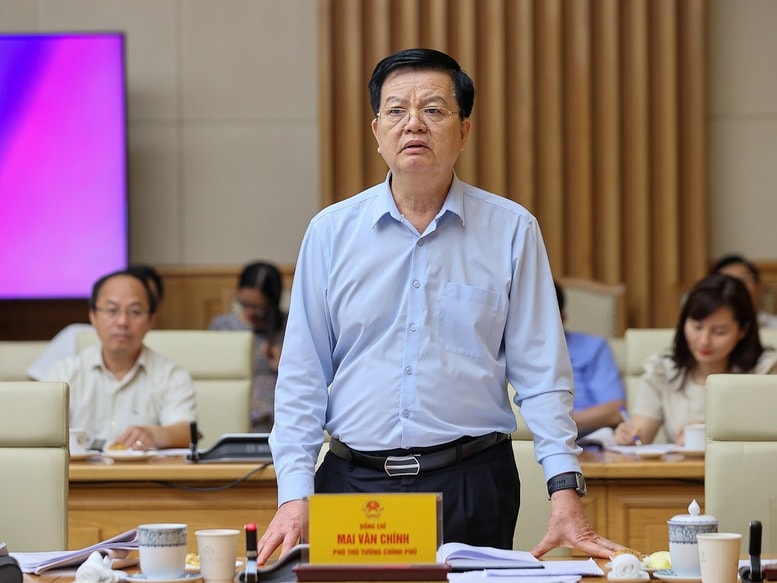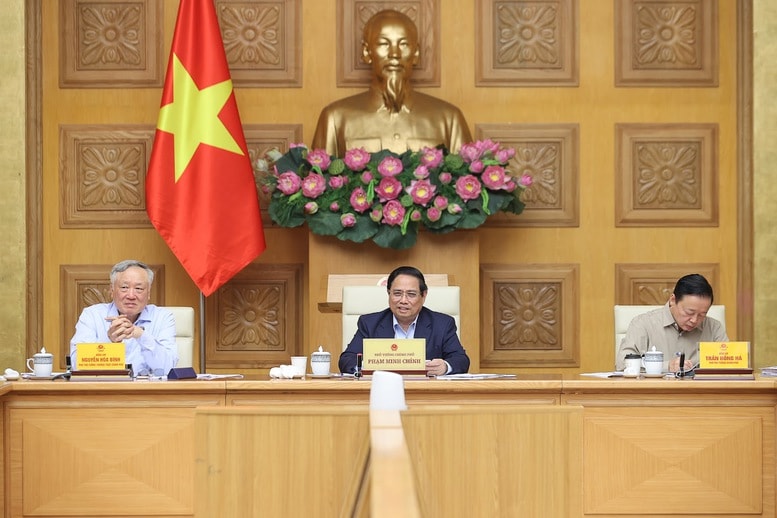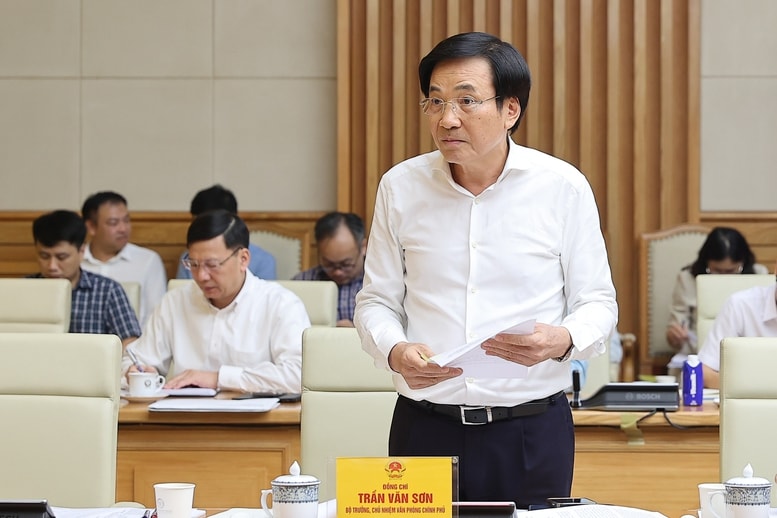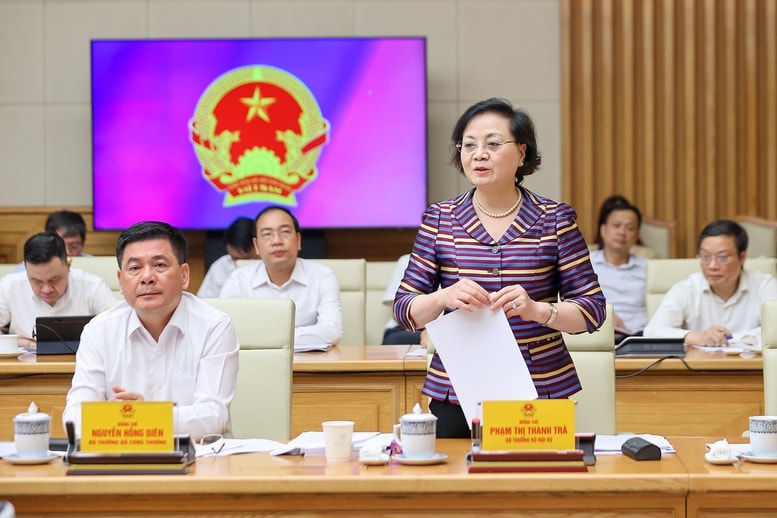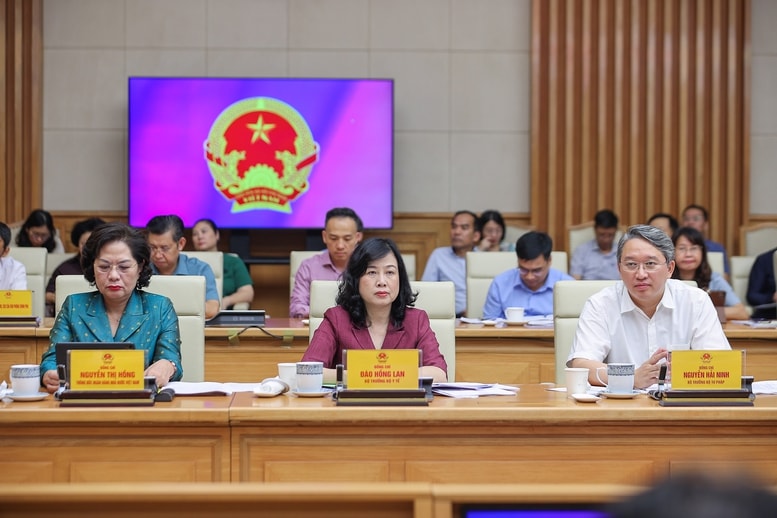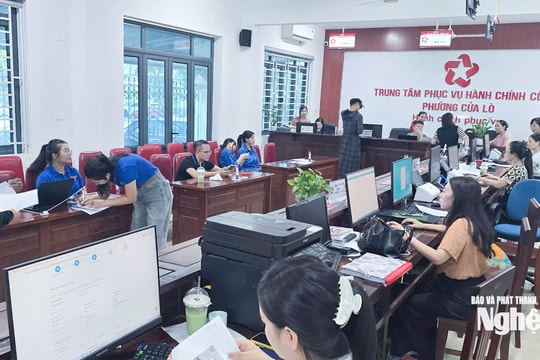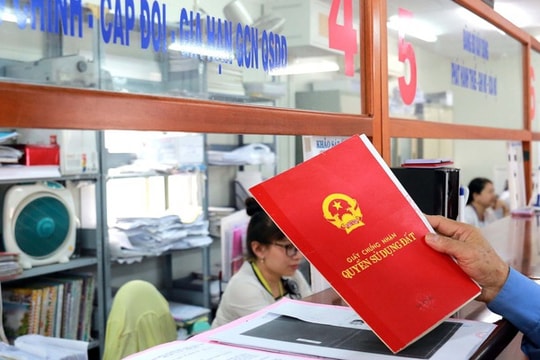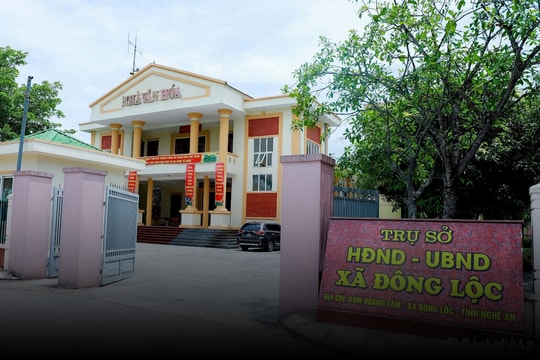The Prime Minister chaired a conference to evaluate the organization and operation of two-level local governments.
Prime Minister Pham Minh Chinh chaired a conference to evaluate the results of the reorganization of the internal apparatus of ministries and branches and review one month of operating the two-level local government on the afternoon of July 28.
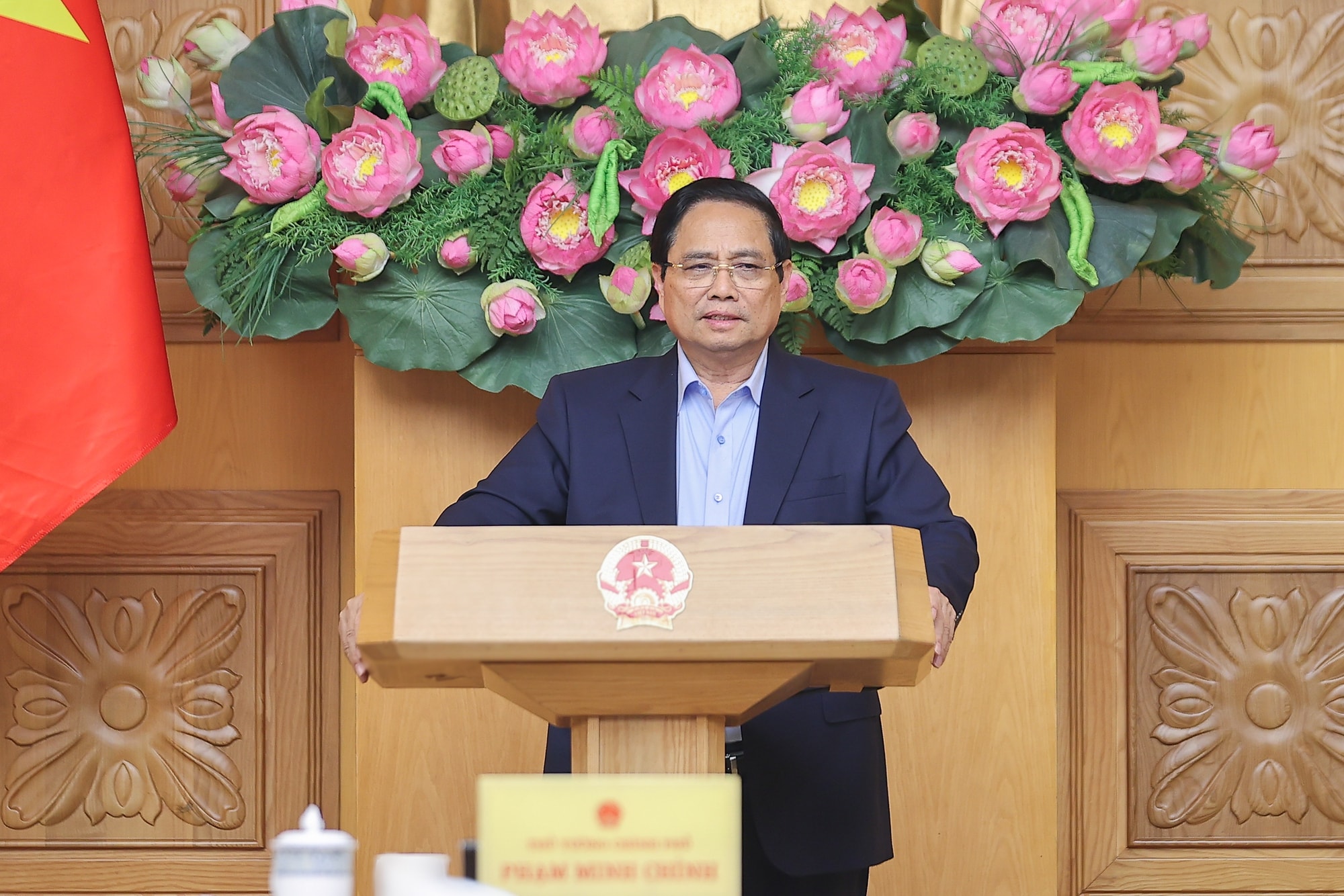
Attending the conference were: Permanent Deputy Prime Minister Nguyen Hoa Binh; Deputy Prime Ministers Tran Hong Ha, Bui Thanh Son, Nguyen Chi Dung, Mai Van Chinh; Ministers, Heads of ministerial-level agencies, Government agencies; leaders of ministries, branches and central agencies.
Comprehensive assessment
Opening the conference, Prime Minister Pham Minh Chinh said that after half a year of restructuring the political system, ministries, branches and government agencies have been operating in an orderly manner, ensuring their political tasks as required. However, there are opinions that the apparatus in some places is still cumbersome.
Along with that, after 1 month of operation, the local government at 2 levels has basically operated smoothly and continuously, but through inspection and supervision, it shows that there are still some difficulties and problems related to land, administrative procedures, schools, hospitals, admission authority, etc.
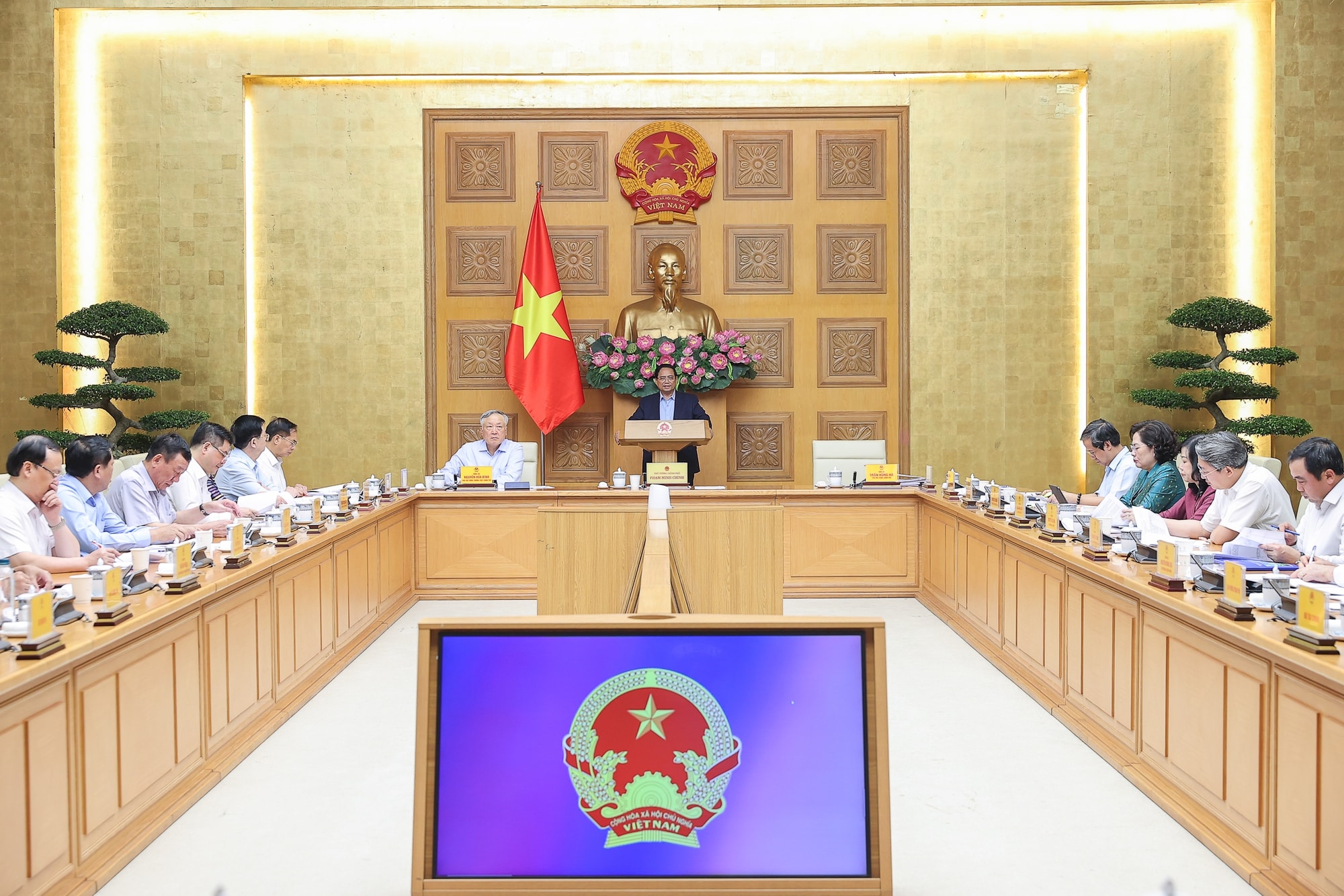
In particular, infrastructure, especially information technology infrastructure and digital transformation in many localities, is still facing difficulties and shortcomings in the context that localities are using many different software, which is difficult to connect and integrate. Broadband internet access is still limited. Many people are not familiar with using applications in online public services; data digitization is still limited...
Appreciating the efforts of ministries, branches, and localities, especially the Ministry of Home Affairs, in the "revolution in reorganizing the political system" and "reorganizing the country", Prime Minister Pham Minh Chinh also frankly pointed out that the implementation process has encountered a number of difficulties and problems.
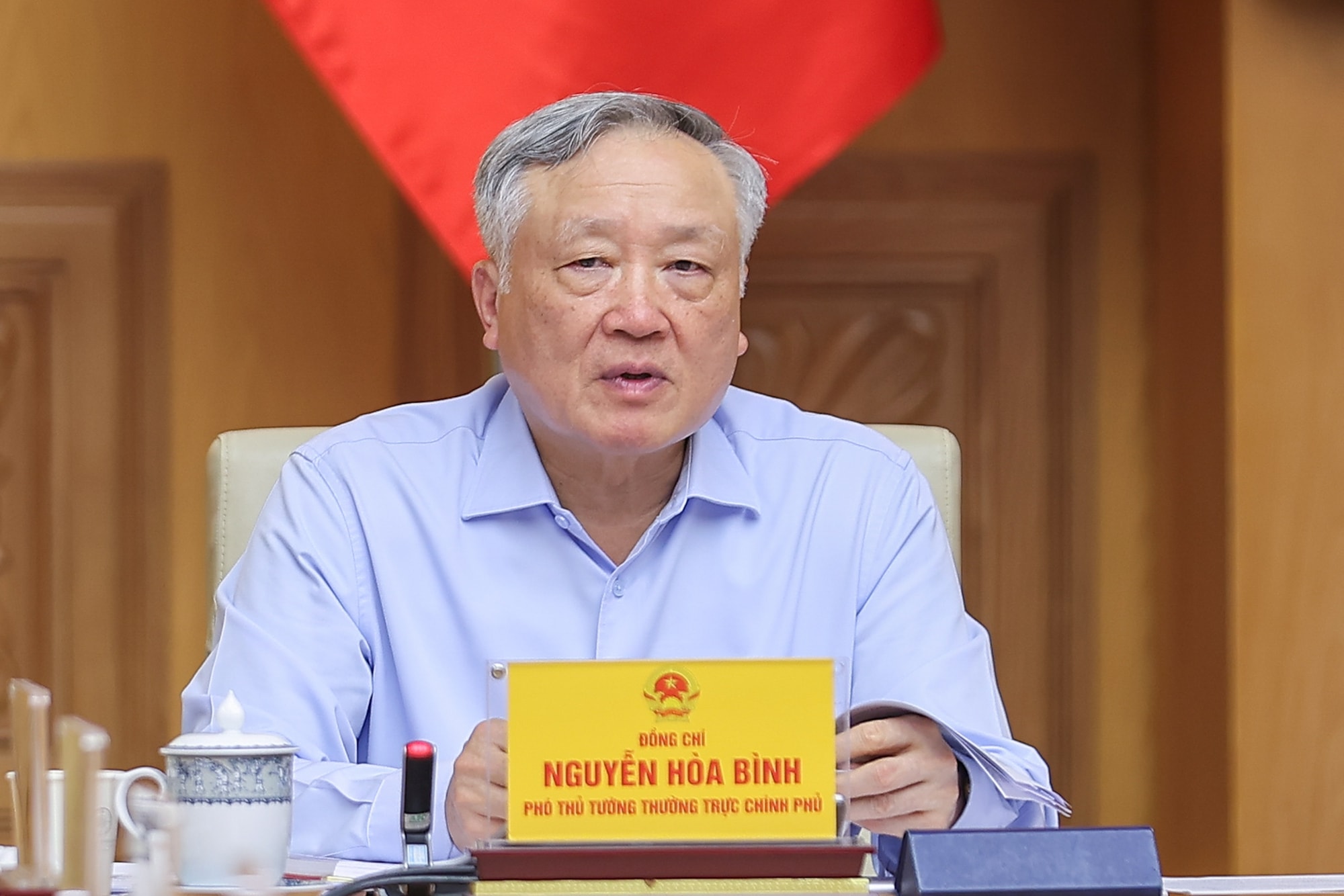
In the spirit of resolving any difficulties or problems, the Prime Minister requested leaders of ministries, branches and agencies to focus on discussing and assessing the situation, identifying difficulties and problems; and at the same time, proposing tasks and solutions so that the administrative system can operate smoothly, continuously, effectively and efficiently.
Reiterating General Secretary To Lam's direction to renew thinking and take drastic actions, Prime Minister Pham Minh Chinh requested ministries and branches to review issues related to institutions and laws related to the operations of ministries, branches, agencies and local authorities; whether the organizational arrangement is appropriate; whether the decentralization and delegation of powers are reasonable and clear; what facilities and technical infrastructure need to be supplemented and arranged to ensure smooth and effective operation of the two-level local authorities; the issue of tightening discipline, administrative discipline, public service performance, strengthening urging, inspection, examination, supervision, etc.
The results achieved are fundamental, strategic, and long-term.
Regarding the results achieved after 1 month of implementing the 2-level local government model, the Prime Minister summarized that in general, the Party's will and the people's will met when shifting from a passive administrative state, heavily focused on management, to a proactive state, actively serving the people and creating development, while at the same time, reducing compliance time and costs for people and businesses.
According to the Prime Minister, this major and important policy of the Party is in line with the people's wishes and is suitable to the current conditions and circumstances of the country, so it is approved by the people and supported by international friends.
Deputy Prime Minister Mai Van Chinh speaks at the Conference. Photo: VGP/Nhat Bac
The Prime Minister pointed out 5 outstanding results.
Firstly, the two-level local government apparatus initially operated stably and smoothly. Most localities completed the arrangement of government organization, ensuring uninterrupted administrative operations. The newly merged provincial governments and newly established communes quickly went into operation, leaving no management gaps and serving the people better.
The Prime Minister pointed out five outstanding results. Photo: VGP/Nhat Bac
Up to now, 32/34 localities have established provincial-level Public Administration Service Centers, 32/34 localities have established 3,127 commune-level Public Administration Service Centers; Hanoi and Quang Ninh operate according to the model of one-level Public Administration Service Centers and organize branches or public administration service points.
Second, public administrative services are maintained continuously, without interruption during the transition process.
The National Public Service Portal has been upgraded, seamlessly connected with 34/34 provincial administrative procedure settlement information systems and closed the provincial Public Service Portal interface from July 1, 2025. The National Public Service Portal has met the requirement of 120,000 concurrent users (CCU). From July 1, 2025 to now, the system has recorded the highest number of users reaching about 50,000 concurrent users (41.6% of capacity).
Third, the work of ensuring political security and social order and safety during and after the administrative unit reorganization process has been maintained. Although the boundaries of many administrative units have changed significantly, the local situation remains stable and the people have high consensus.
Fourth, the direction and management from the central to local levels is smooth and synchronous. The Government, the Prime Minister and central ministries and branches have taken synchronous action and promptly resolved difficulties and obstacles for localities. More than 60 guiding documents and dozens of field inspection working groups were deployed in the first month alone.
Fifth, we have promoted the reduction of administrative procedures, decentralization, and delegation of power along with resource allocation, improved enforcement capacity, and strengthened inspection and supervision.
Minister and Head of the Government Office Tran Van Son speaks at the Conference. Photo: VGP/Nhat Bac
The Government has issued 28 Decrees decentralizing 556 administrative procedures from the central level to the local level; decentralizing 18 administrative procedures from the district level to the provincial level, 278 administrative procedures to the commune level; abolishing 74 administrative procedures. Up to now, a number of ministries and ministerial-level agencies have strongly decentralized administrative procedures from the central level to the local level, the number of administrative procedures under the authority of the ministry is about less than 30% such as: Ministry of Justice (18.1%), Ministry of Home Affairs (26.4%), Government Inspectorate (32.3%), Ministry of Education and Training (36%).
The Prime Minister said that the results achieved are fundamental, strategic, and long-term, demonstrating the great efforts and determination of all levels and sectors and the support and enthusiastic reception of the people in implementing Resolution 60-NQ/TW of the Central Committee.
In addition to the above results, the Prime Minister pointed out that there are still shortcomings and limitations that need to be overcome immediately, and work that needs to be continued related to the institutional and legal system on the organization of two-level local governments. Many sub-law documents need to be issued or updated promptly; the improvement of the organizational apparatus and personnel is both lacking and redundant; decentralization and delegation of power still have overlaps and problems.
Along with that, the financial and budgetary mechanisms are not really transparent, many localities reflect that the commune-level budget is still limited, while having to manage a larger area than before; the conditions to ensure the operation of the 2-level government are still inadequate, especially the information technology infrastructure; propaganda and dissemination work on the 2-level local government model needs to be done better...
Minister of Home Affairs Pham Thi Thanh Tra reports at the Conference. Photo: VGP/Nhat Bac
The new apparatus requires new behavior, new thinking, and decisive action.
In the coming time, the Prime Minister requested to thoroughly grasp the viewpoint of needing to make greater efforts, attempts, and determination; act more resolutely and effectively; complete each task, do each task properly, assign "6 clear tasks", "do not say no, do not say yes, do not say difficult things but do not do".
Ministries, localities, agencies, especially leaders, need to base on their functions, tasks, and powers to actively and proactively carry out tasks, strengthen inspection, supervision, grasp the situation, remove difficulties and obstacles, handle newly emerging issues, assess people's satisfaction level...; especially create motivation and inspiration for people to actively participate in this work in particular, and the task of building and protecting the Fatherland in general.
The Prime Minister pointed out the common tasks of ministries, branches and localities in continuing to review and perfect the legal system related to the organization and operation of two-level local governments; continuing to perfect the organizational apparatus in administrative units after the rearrangement; quickly rearranging and reassigning appropriate staff and civil servants, especially perfecting the leadership at the commune level; continuing to promote decentralization and delegation of authority reasonably and effectively along with resource allocation, improving implementation capacity and strengthening inspection and supervision.
In particular, in the initial phase of operating the new model, the Ministries need to focus on providing guidance on administrative procedures, budget management, organizational structure and human resource management for the provincial and communal levels... in accordance with the authority of each level. Along with delegating authority, it is necessary to strengthen supervision and inspection work to avoid situations where localities do not understand correctly or do not strictly implement.
Government members and delegates attending the conference. Photo: VGP/Nhat Bac
Regarding the financial and budgetary mechanism, the Prime Minister directed the development of a financial mechanism suitable for the two-level local government model, ensuring resources for effective local operations. For newly formed provinces and cities based on the merger of many old administrative units, it is necessary to calculate support mechanisms and reasonably regulate resources.
At the same time, central and local agencies must strengthen management and closely monitor the use of budgets and public assets after the merger, effectively use headquarters, avoid loss and waste; ensure resources are used for the right purposes and effectively. Along with that, ensure synchronization of planning and conditions for implementation.
The Prime Minister requested to accelerate the restructuring of processes and the provision of online public services on the National Public Service Portal in accordance with the objectives and requirements of Plan No. 02 of the Central Steering Committee on Science, Technology, Innovation and Digital Transformation; ensuring smooth, effective and uninterrupted operation. Quickly fix errors on information systems managed by ministries and branches; complete by August 2025.
The Prime Minister noted that it is necessary to focus on doing a good job of policy communication and propaganda about the purpose and significance of the two-level local government model so that people can understand and support it; commend and replicate good models and good practices; and at the same time, establish channels to receive feedback and recommendations from the grassroots for timely handling or reporting to competent authorities for resolution.
The Prime Minister emphasized the spirit of everyone getting involved, especially leaders in leading and directing agencies under their authority; the new apparatus requires new behaviors, innovative thinking, and decisive actions; close and synchronous coordination, especially in digital transformation, building and connecting databases of sectors.
The Prime Minister requested ministries and branches to continue to monitor and urge localities according to their fields; assigned comrades continue to directly inspect the situation in localities, listen to opinions from the grassroots to promptly direct the removal of difficulties and obstacles.
The Prime Minister believes that with high political determination and close direction from the Central Executive Committee, the Politburo, the Secretariat, and General Secretary To Lam, together with the solidarity and consensus of the entire political system and the support of the people, the two-level government apparatus will carry out its work more and more smoothly, effectively, and serve the people and businesses better and better.

